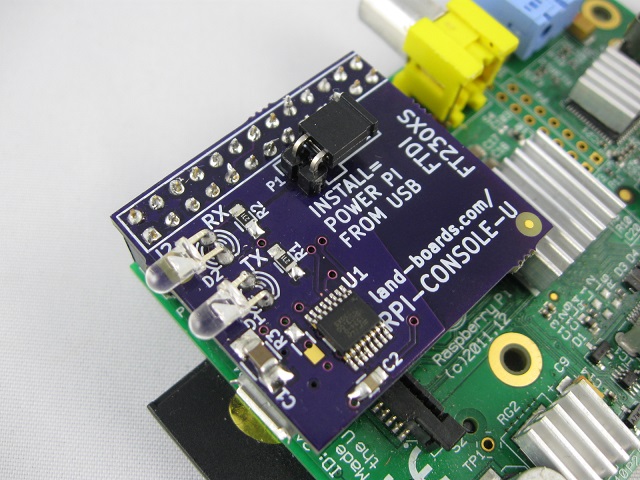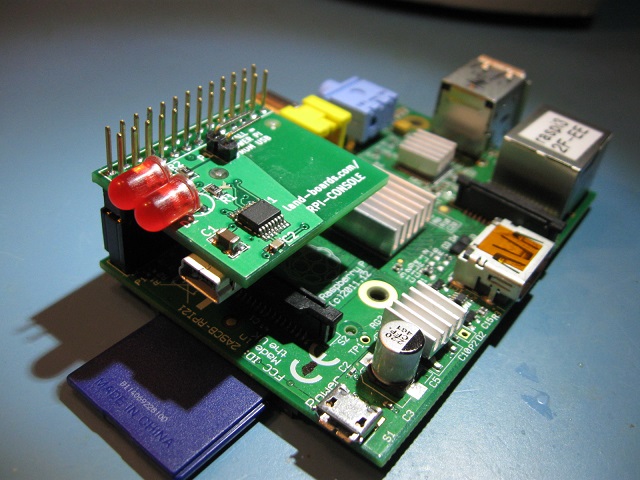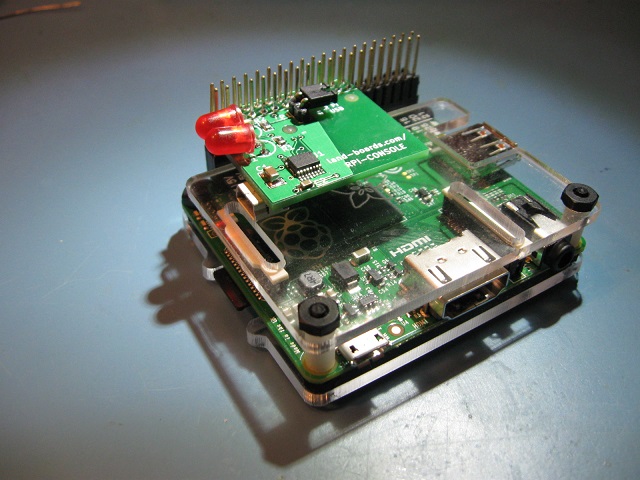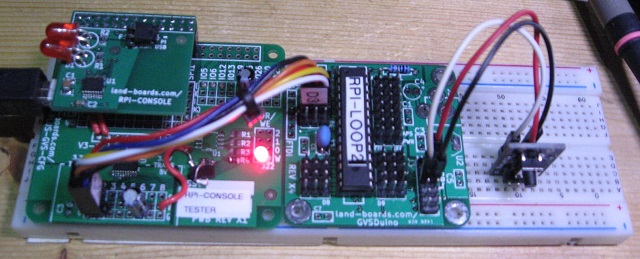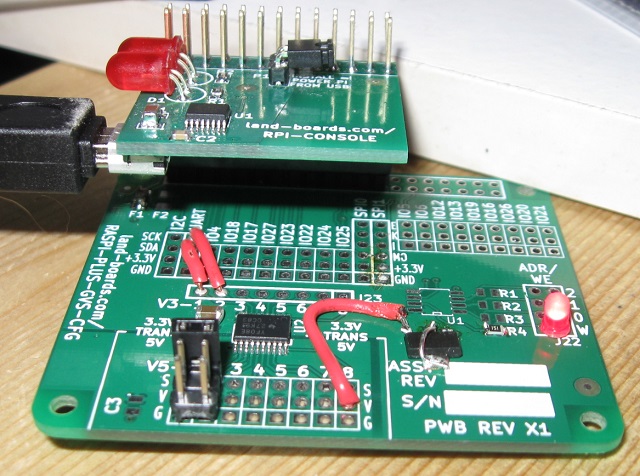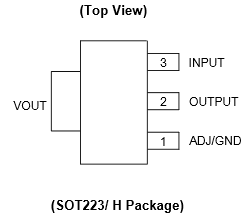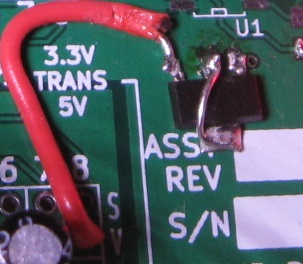Difference between revisions of "RPI-CONSOLE-U"
Jump to navigation
Jump to search
Blwikiadmin (talk | contribs) (→Specs) |
Blwikiadmin (talk | contribs) |
||
| Line 71: | Line 71: | ||
* Loop forever | * Loop forever | ||
* [https://github.com/land-boards/lb-Arduino-Code/tree/master/LBCards/RPI-Console/RPI-LOOP2 Code on GitHub] | * [https://github.com/land-boards/lb-Arduino-Code/tree/master/LBCards/RPI-Console/RPI-LOOP2 Code on GitHub] | ||
| + | ** Uses Software Serial to add a second UART to the [[GVSDuino]] | ||
| + | ** Test pattern code | ||
| + | <pre> | ||
| + | mySerial.println("The quick brown fox jumped over the lazy dog"); | ||
| + | mySerial.println("0123456789"); | ||
| + | mySerial.println("asdfghjkl"); | ||
| + | mySerial.println("Hit keys to test"); | ||
| + | </pre> | ||
=== Test Procedure === | === Test Procedure === | ||
Revision as of 15:27, 31 March 2022
Contents
Features
- Console port lets you talk to your Raspberry Pi over USB without a keyboard/mouse/monitor or Ethernet connection.
- 115200 baud
- USB Micro-B connector
- Mounted on the bottom of the card
- See also our USB Mini connector version
- Real FTDi FT230XS
- Jumper selectable - power the Pi from your computer's USB port.
- Some nwere Pi cards may take too much power
- Transmit/receive LEDs
- 26-pin connector works with Model A and Model B Pis
Options
Extended 26-pin Connector
From RPI-CONSOLE page
Extended 40-pin Connector
From RPI-CONSOLE page
Low profile 26-pin Connector
Driver
Prototype Qualification Tests
Factory Acceptance Tests
Procedure to test RPI-Console-U card
GVSDuino wired to custom board
- Custom RASPI-PLUS-GVS-CFG Test card to GVSDuino card wiring
- Wire V5-1 header pin S (pin 3) to GVSDuino GVS pin D3 SIG (TX)
- Wire V5-2 header pin S (pin 3) to GVSDuino GVS pin D2 SIG (RX)
- Wire V5-1 header pin GND (pin 1) to GVSDuino GVS pin D2 GND
- Wire V5-2 header pin GND (pin 1) to GVSDuino GVS pin D3 GND
- Wire V5-1 header pin +5V (pin 2) to GVSDuino GVS pin D2 +5V power
- Wire V5-2 header pin +5V (pin 2) to GVSDuino GVS pin D3 +5V power
- GVS-Switch to GVSDuino wiring
- GVS-Switch Pin 1 (GND) to GVSDuino J3 pin 6
- GVS-Switch Pin 2 (VCC) to GVSDuino J3 pin 2
- GVS-Switch Pin 3 (RESET*) to GVSDuino J3 pin 7
Test Software
- Push button to reset on GVSDuino to send out canned message
- Poll for receive character
- When character is received, echo back character
- Loop forever
- Code on GitHub
- Uses Software Serial to add a second UART to the GVSDuino
- Test pattern code
mySerial.println("The quick brown fox jumped over the lazy dog");
mySerial.println("0123456789");
mySerial.println("asdfghjkl");
mySerial.println("Hit keys to test");
Test Procedure
- Test setup as above
- Test setup powered down
- Install UUT (RPI-Console-U card being tested)
- Connect USB Micro cable from Test Computer to UUT
- Boards should power up
- Look in Device manager to make sure COM port was added
- Run putty on Test Computer
- Select COM port in putty
- 9600, n, 8, 1
- No handshake
- Hit reset on GVS-Switch card on 830 point breadboard
- Verify the message comes back
The quick brown fox jumped over the lazy dog 0123456789 asdfghjkl Hit keys to test
- Type and verify that the character comes back
- Disconnect USB to RPI-Console
Custom wired RASPI-PLUS-GVS-CFG bare board
- Card is connected to act as a Raspberry Pi emulator
- Install 20x2 male header going up on board to board connector at top of the board
- Install the TXS0108EWPR 3.3V<>5V Voltage Translator at U2
- Install F1 (5V fuse)
- Install 3.3V regulator at C2 position
- Wire the Vreg
- VReg pin 1 goes to ground side of C2
- VReg pin 2 goes to +3.3V side of C2
- Jumper tab to VReg pin 2
- Wire VReg pin 3 to V5-8 pin 2 (+5V)
- Add 47 uF cap from IO16-2 (+5V) and IO16-1 (GND)
- Install 330 Ohm resistor at R4
- Install 3mm LED at W jumper (J22-1 to J22-2) position (Cathode of LED to pin 1 of J22)
- Add wire from UART connector pin 3 to V3-1 pin (TXD on CFG card) (Serial out from Pi)
- Add wire from UART connector pin 4 to V3-2 pin (RXD on CFG card) (Serial in to Pi)
- Install 2x3 header at V5-1/V5-2 position
- V5-1 (pin 1 = GND, pin 2 = +5V, pin 3 = TxD - Serial out from the Arduino)
- V5-2 (pin 1 = GND, pin 2 = +5V, pin 3 = RxD - Serial in to the Arduino)
Specs
External links
Rev X3 (vs X2)
- Moved "Power Pi from USB" connector to center of card
- Rev X2 (vs X1)
- Moved connector slightly closer to the edge
- Made USB connector PWB pads longer
- Adds ID resistor pads to USB pin
- Not populated
Rev X1 Checkout
- Micro USB mounting holes fit well
- Connector could be slightly farther to the edge
- USB connector PWB pads were too short - trimmed pins to fit
- Ordered 3 more from OshPark new X2 rev

